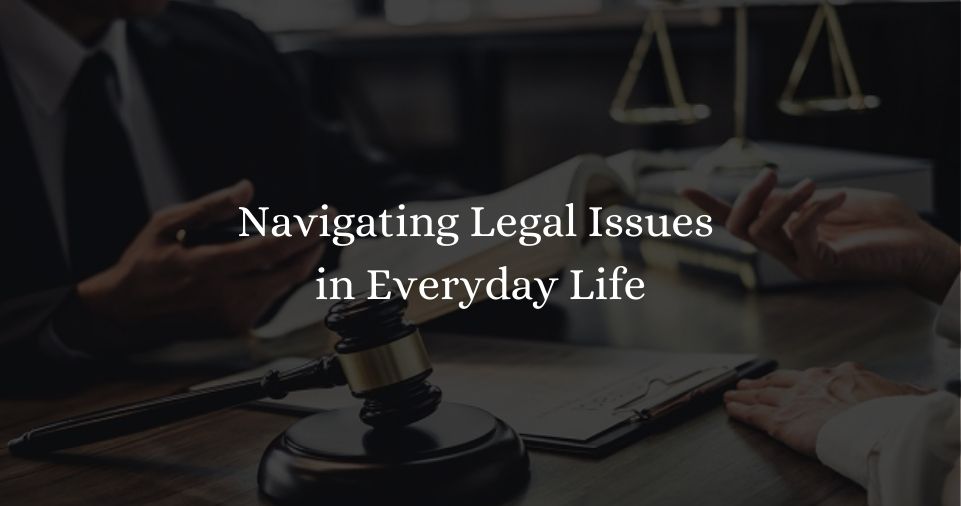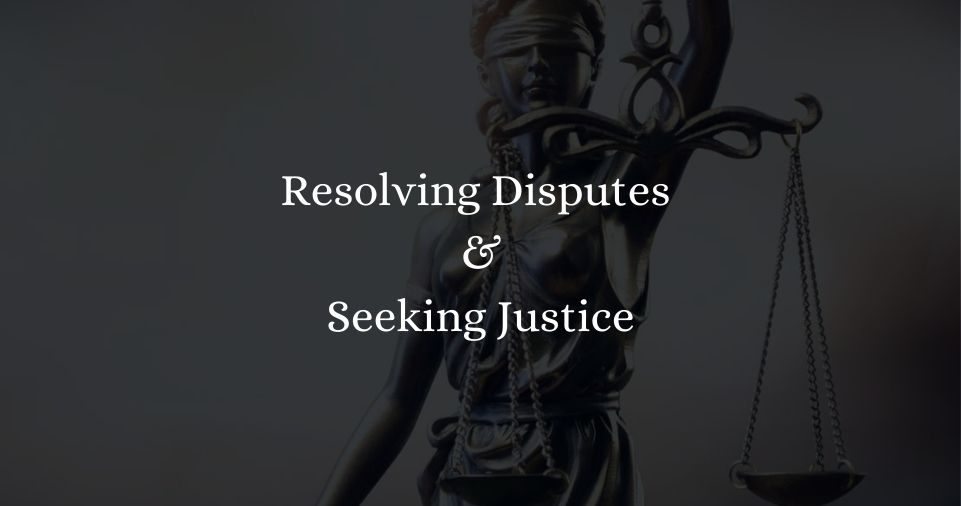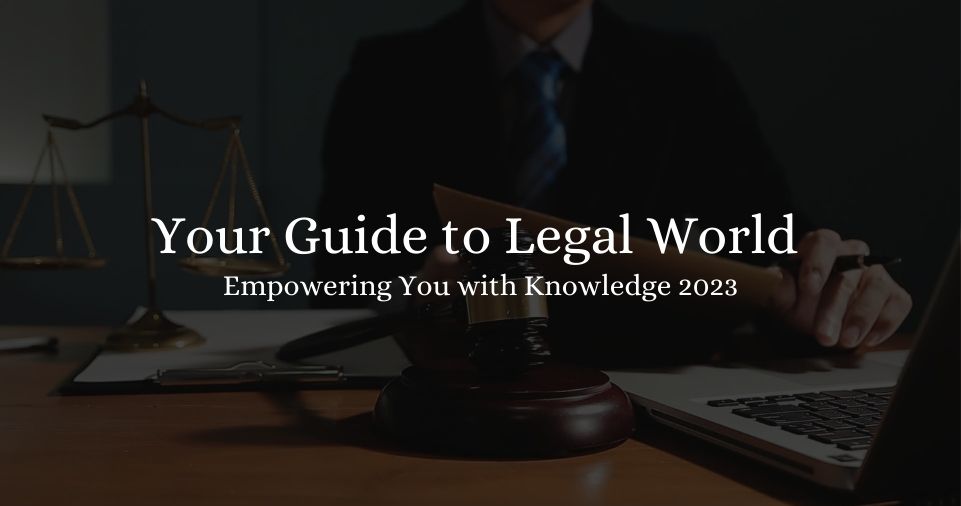Navigating the complexities of the legal landscape can be a daunting task, whether you’re facing a personal legal issue, seeking legal advice, or simply interested in expanding your understanding of the law.
The legal world is vast, with intricate concepts, jargon, and procedures that can leave you feeling overwhelmed and unsure of where to start.
But fret not! In this comprehensive guide, we are here to be your trusted companion, providing you with the knowledge, insights, and resources you need to confidently navigate the legal world.
We understand the challenges you may encounter and the questions that may arise along the way.
That’s why we are committed to offering practical solutions, expert guidance, and empowering information to help you overcome legal obstacles.
At its core, this guide aims to address the problems and uncertainties that many individuals face when dealing with legal matters.
The legal world can often feel intimidating, leaving people feeling lost without a roadmap.
However, with the right information and guidance, anyone can gain a better understanding of the legal landscape and make informed decisions.
Throughout this post, we will delve into various aspects of the legal world, providing you with valuable insights, actionable tips, and real-life examples.
Our goal is to demystify complex legal concepts, break down barriers, and empower you with the knowledge necessary to navigate the legal world confidently.
Exploring Key Legal Concepts
Breaking Down Legal Terminology and Jargon
Understanding the complex terminology and jargon in the legal world can feel like deciphering a foreign language.
However, it is crucial to grasp these concepts to navigate the legal landscape effectively. By breaking down legal terminology into simpler terms, you can gain a clearer understanding of the intricacies involved.
For instance, the term “tort” may sound unfamiliar but it refers to a civil wrong committed by one party that causes harm or injury to another.
Similarly, “jurisdiction” refers to the authority given to a legal body to enforce laws or administer justice within a particular area.
Common Legal Terms and Their Meanings
| Legal Term | Definition |
|---|---|
| Tort | A civil wrong that causes harm or injury to another individual. |
| Jurisdiction | The official power to make legal decisions and judgments in a specific area or over certain matters. |
| Injunction | A court order requiring a party to do or refrain from doing specific acts. |
| Precedent | A principle or rule established in a previous legal case that is persuasive or binding in future cases. |
| Plaintiff | The party who initiates a lawsuit by filing a complaint in court. |
| Defendant | The individual or entity accused or sued in a court of law. |
To enhance your legal vocabulary, consider exploring legal dictionaries or online resources that provide comprehensive explanations of legal terms. These references can serve as valuable tools whenever you come across unfamiliar words or phrases in legal documents, contracts, or discussions.
Fundamental Principles of the Legal System
To fully comprehend the legal world, it is essential to familiarize yourself with the fundamental principles that underpin the legal system. These principles are the bedrock upon which laws are built and justice is administered.
- Presumption of Innocence: Every individual is considered innocent until proven guilty. This principle ensures fairness and safeguards the rights of individuals accused of a crime.
- The Rule of Law: The rule of law asserts that all individuals, regardless of their position or power, are subject to the law. This principle upholds equality, ensures accountability, and promotes a just society.
Understanding these fundamental principles will provide you with a solid framework to interpret legal proceedings, evaluate arguments, and make informed decisions when faced with legal challenges.
Navigating Legal Issues in Everyday Life

Knowing Your Legal Rights and Responsibilities
In the legal world, knowledge is power. Understanding your legal rights and responsibilities empowers you to protect yourself, make informed choices, and act responsibly within the confines of the law.
Your Legal Rights:
- Freedom of Speech: This allows you to express your opinions without fear of censorship or retribution.
- Right to Privacy: Ensures that your personal information remains secure and is not disclosed without your consent.
Alongside these rights, you also have responsibilities, such as adhering to laws, paying taxes, or respecting intellectual property rights. Fulfilling these obligations contributes to a harmonious society and helps avoid legal repercussions.
Common Legal Challenges and Their Solutions
Legal challenges can arise in various aspects of our lives. Whether it’s a landlord-tenant dispute, an employment issue, or a consumer rights concern, having a basic understanding of common legal challenges and their solutions can save you time, money, and stress.
Common Legal Issues and How to Resolve Them
| Legal Challenge | Solution |
|---|---|
| Landlord-Tenant Dispute | Familiarize yourself with local tenant rights and, if necessary, pursue legal action. |
| Workplace Discrimination | Understand labor laws, report the issue to HR or a regulatory body, and consult an attorney. |
| Consumer Rights Violations | File complaints with relevant consumer protection agencies or pursue small claims court. |
| Intellectual Property Infringement | Consult an intellectual property lawyer to protect your work and assert your rights. |
By understanding your rights and available legal remedies, you can take appropriate steps to protect yourself and seek justice when needed.
Also Read: Financial Fitness: Managing Finances for Business Success 2024
Seeking Legal Advice and Representation
When and How to Consult a Lawyer
In the intricate legal world, there are times when seeking legal advice and representation becomes necessary. But how do you know when it’s the right time to consult a lawyer? Here are a few scenarios where seeking legal guidance can be beneficial:
- Complex Legal Matters: When entangled in issues beyond your understanding, seek the guidance of a knowledgeable attorney.
- Legal Documentation: When faced with contracts or agreements involving significant consequences, a lawyer can help protect your interests.
- Disputes and Conflict Resolution: A lawyer can navigate negotiation, mediation, or litigation to resolve conflicts effectively.
When consulting a lawyer, gather all relevant documents and facts related to your case to help the attorney provide appropriate guidance. Lawyers are bound by strict ethical obligations to maintain confidentiality, so you can feel secure discussing sensitive matters with them.
Understanding the Role of Legal Professionals
Legal professionals play a vital role in the legal system. Their expertise, knowledge, and experience are invaluable when navigating legal complexities.
Roles of Legal Professionals:
- Legal Counsel: Lawyers provide expert opinions, assess risks, and help clients make informed decisions.
- Advocacy and Representation: Attorneys represent clients in negotiations, mediations, and litigation.
- Legal Research and Analysis: They analyze case laws, statutes, and regulations to build strong legal arguments.
- Document Drafting: Lawyers draft legal documents with precision to ensure enforceability and protection of interests.
Choosing the right legal professional who specializes in your area of law ensures that you get the best representation possible.
Legal Processes and Procedures
Overview of Legal Proceedings
Understanding the basic framework of legal proceedings is essential for navigating the legal world. Legal processes provide a structured approach to resolving disputes and seeking justice.
Stages of Legal Proceedings:
- Pleadings: Initial stage where the plaintiff files a complaint and the defendant responds.
- Discovery: Both parties gather evidence and exchange information.
- Pretrial Proceedings: Settlement negotiations, motions, and hearings occur.
- Trial: Evidence is presented before a judge or jury, and arguments are made.
- Judgment and Appeals: After the trial, a judgment is issued. Parties may appeal the decision to a higher court.
The complexity and duration of legal proceedings can vary, depending on the jurisdiction and type of case.
Step-by-Step Guide to Common Legal Processes
Certain legal processes are commonly encountered in various situations. Here’s a guide to help you understand some of these legal processes:
Table: Common Legal Processes and Key Steps
| Legal Process | Key Steps |
|---|---|
| Estate Planning | Identify beneficiaries, appoint guardians, draft wills, trusts, and assign powers of attorney. |
| Contracts and Agreements | Negotiate terms, draft, review, revise, and sign contracts. |
| Divorce Proceedings | File petition, property division, child custody arrangements, and spousal support determinations. |
| Criminal Proceedings | Arrest, arraignment, bail hearings, pretrial motions, plea negotiations, trial, and sentencing. |
These legal processes require attention to detail, and it’s often wise to consult legal professionals to guide you through the complexities.
Resolving Disputes and Seeking Justice

Alternative Dispute Resolution (ADR) Methods
While litigation is a common method of resolving disputes, alternative dispute resolution (ADR) methods offer more flexible, cost-effective ways to resolve conflicts.
- Mediation: A neutral mediator helps parties reach a mutually acceptable resolution.
- Arbitration: A formal ADR method where an arbitrator issues a binding decision after reviewing evidence.
- Negotiation: Direct discussions between parties to resolve disputes without third-party intervention.
- Collaborative Law: Both parties work with their attorneys to resolve disputes without going to court.
Choosing the right ADR method depends on the nature of the dispute and the willingness of parties to collaborate.
The Role of Courts and Litigation
Courts provide a structured forum for resolving legal disputes. They ensure that the rule of law is upheld and provide a fair process for both parties involved in a case.
Steps in Litigation:
- Filing a Lawsuit: The case begins with the filing of a complaint.
- Pretrial Proceedings: This includes discovery, settlement conferences, and motions.
- Trial: Both parties present evidence, and a judge or jury makes a ruling.
- Judgment Enforcement: The court’s decision is enforced through legal means.
Litigation is typically the last resort when other methods of dispute resolution fail, but it provides a final and binding resolution to conflicts.
Conclusion: Empowering Yourself with Legal Knowledge
Throughout this journey into the legal world, we have explored key legal concepts, how to navigate legal issues in everyday life, the importance of seeking legal advice, and common legal processes.
Armed with this knowledge, you are better equipped to make informed decisions and protect your rights.
Remember, legal knowledge is for everyone. Whether you are dealing with a personal legal issue, drafting a contract, or resolving a dispute, understanding your legal rights and responsibilities is crucial.
Seek the guidance of legal professionals when necessary, stay informed, and let your legal knowledge serve you well.
FAQs
Q: Do I always need a lawyer for legal matters?
A: While it’s not always necessary, seeking legal advice is recommended for complex legal matters, such as criminal cases or business transactions.
Q: What are the benefits of alternative dispute resolution methods?
A: ADR methods, such as mediation and arbitration, offer cost-effective, quicker resolutions with greater control over outcomes.
Q: How can I stay updated with changes in laws and regulations?
A: Follow reputable legal publications, government websites, or consult legal professionals to stay informed.
Q: Can I represent myself in legal proceedings?
A: Yes, but in complex cases, it’s recommended to seek legal representation for the best possible outcome.


